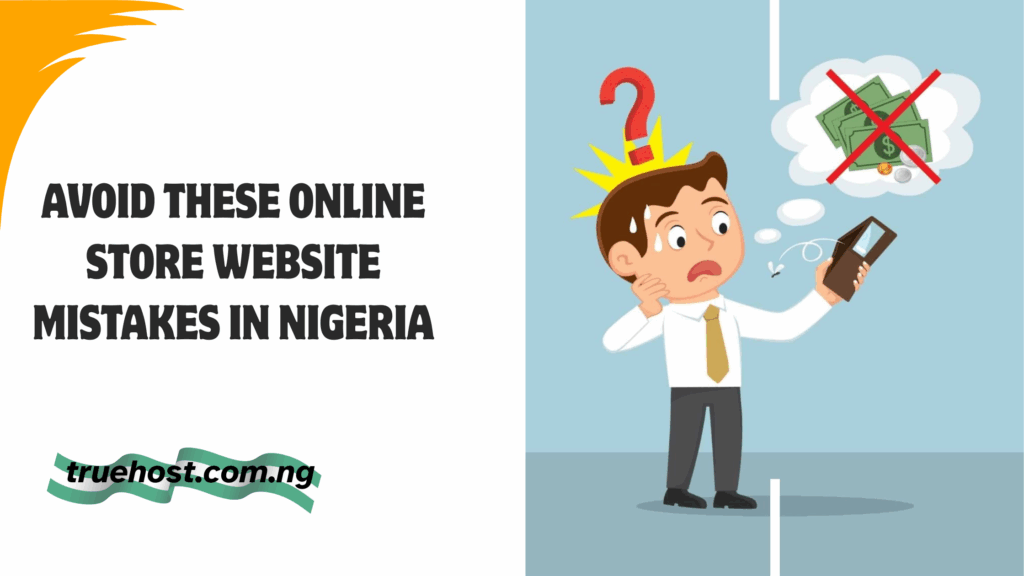Launching an online store website in Nigeria is one of the smartest business moves you can make today. I mean, E-commerce is booming.
From clothing and beauty products to electronics and food delivery stores, people are now adopting the concept of ordering things online. But while the potential is massive, setting up an online store website can be quite tough. And when done wrongly, you are bound to fail.
To help you get it right from the start, we crafted a guide on 10 mistakes you should avoid when setting up your online store website in Nigeria. Even better is we tell you how you can avoid them.
Using a Generic or Free Theme
Your online store’s design is the first impression customers get when they click on your website. A generic theme not only fails to reflect your brand, it also lacks some very key features like mobile responsiveness, product filters, or cart optimisation. Some free themes even come with bloated codes that slow down your site.
Your online store website is not just another blog site, you are actually planning to earn from it. So give it all the care and seriousness it deserves. Choose a professional theme that is specifically built for e-commerce from re-known e-commerce platforms.
Platforms like WooCommerce, Shopify and BigCommerce give you store ready themes that will help your users easily navigate, search and even make purchases.
Tip: Go a step further and invest in customization. You could add your logo, change the colors and even make sure the themes and designs match your brand identity.
Launching Without a Marketing Plan
You could have the best products and the most beautiful online store website out there, but without traffic, it all won’t matter. Building an online store does not mean that people will come.
One good scenario is seen back in Ibadan. Precisely Agodi GRA area. A talented food vendor had set up her store there and had the tastiest local meal offerings in the area. Her amala and ofada rice were constantly praised by the loyal customers, many of whom were from the neighbourhood and came daily.
The downside is she had never branded her business. The business had no name, no signage and worse, no phone number. She had no social media or even photos of her meals online. At this point you can already guess the aftermath.
There was no way customers outside the neighbourhood would have known about her. So, despite the best food around, her business was unable to scale, attract corporate lunch orders, or even join delivery platforms. In the end, word-of-mouth was not enough, especially in an era where everything is being done online.
What lesson do we learn here? Without a properly planned traffic growth and social proof, even a well-prepared store with the best product can fail.
Post launch, you need consistent marketing, you need to:
- Run targeted Facebook, Instagram, or Google Ads.
- Grow an email list to re-engage buyers.
Share helpful blog content or guides that attract search engine traffic. - Work with micro‑influencers in your niche.
- Offer time‑limited discounts or free shipping to spark initial orders.
Having a marketing plan is very important. Otherwise, your online store website may exist, but no one may ever visit it.
Choosing the Wrong Hosting Plan
Every online store website needs a hosting partner and plan they can rely on. The last thing you want for your store is for it to crash or be slow or even not secure. This would send all your potential buyers running.
As is, Nigeria already has a lot on its plate with numerous power outages and internet fluctuations which already affect user experience. You cannot afford to add unreliable hosting to the mix.
Many store owners go for the cheapest plan available without taking time to look at what the plan supports in terms of traffic, security needs and the payment gateway integrations.
The fix? Well, it is pretty simple, choose a hosting provider like Truehost. We offer fast, secure and scalable hosting especially for online store websites. Also, look for plans that support SSL, backups, high uptime, and most of all good customer support.
Failing to Secure Your Online Store Website
When you are running an online store website, every now and then, you are collecting customer data. Be it names, emails, addresses and even payment information. Without proper protection, you risk this data being exposed or stolen.
To show you the seriousness of this issue, consider these Vanguard statistics:
- In the first half of 2025, Nigeria saw over 119,000 recorded data breaches and an estimated 152,000 accounts were compromised.
- About 10 out of every 100 Nigerians have had their data exposed through breaches since 2004. This totals to more than 23 million compromised accounts, including 7.3 million emails and 13 million passwords leaked.
These numbers are full proof that cyber threats are real and are an ongoing thing.
To safeguard your online store website, your brand and our customers:
- Always use SSL certificates.
- Keep all platforms, plugins, and software up to date.
- Enable strong, unique passwords and two‑factor authentication.
- Install anti-malware and firewall tools.
- Let customers see security badges and lock icons for added trust.
Without these steps, you risk losing trust of your customers or worse, becoming part of the breach statistics.
Ignoring Mobile Responsiveness
Not that many people have a laptop they can browse on. In fact, over 80% of Nigerians browse the internet with mobile phones. When your online store doesn’t work on mobile, you are pushing away a majority of potential buyers.
Many store owners test their site on a laptop and assume that everything is fine. In truth, product images could be distorted, buttons could be too small to click, or the checkout forms fail to load on mobile devices.
To survive in the e-commerce world in Nigeria, you have to be different from your competitors. Use responsive themes and test your online store website on different screens sizes.
Poor Payment Integrations
There are a variety of payment methods that Nigerian customers use. Be it cards, bank transfers, USSD, and at times even mobile wallets. If your online store website only supports one option or even crashes during payment, you risk losing sales.
To fix this issue, use trusted Nigerian payment gateways like Paystack, Flutterwave or Monnify. These platforms are secure, fast and allow multiple payment methods. They are also easy to integrate smoothly with most of the popular e-commerce platforms.
Overlooking Fast Delivery
People usually prefer to buy online because it is convenient. That convenience is thrown out of the window when delivery takes too long or parcels get lost. With the number of spam reports around, you don’t want to appear suspicious to your customers.
Your online store website should clearly state delivery timelines and even shipping fees. You could even go an extra mile and work with trusted logistics partners who get and understand your target region. This is important especially when dealing with customers from major cities like Lagos, Abuja, or Port Harcourt.
When starting out, you don’t need to offer nationwide delivery immediately. Start with areas you can deliver to first without a fuss then scale gradually. You could even give an incentive like free delivery to customers who order above a certain amount.
Ignoring SEO for Product Pages
Many people and store owners do not know that product pages can rank on Google, but only if they are optimized. Without SEO, your store will heavily rely on social media, if you even have one, and paid ads for traffic.
Try using keyword-rich titles, writing unique product descriptions and even optimize your image alt tags. Do not use the same description that the manufacturer provides.
For example you are advertising a shirt, instead of writing “Blue T-shirt” describe it as “Men’s Round Neck Blue T-shirt for Casual Outfits in Nigeria.” Why is this important, you ask? Well it helps your online store website appear in specific search queries when customers search for products near them.
No Clear Return or Refund Policy
For e-commerce, trust is a really big issue. Many of the customers you will encounter fear paying for a product they might never receive or even receive a fake or a damaged product with no option for returns.
If your online website store does not have a return and refund policy, many first time buyers will fear trusting you. All people want is the assurance that they can return a product if it doesn’t meet their expectations.
Just create a simple and honest policy. In it state how many days buyers have to return items, what condition the product must be in and how the refunds will be processed.
Ready to Set Up Your Online Store Website?
Take the guesswork out of launching your store. Get started with a Truehost e-commerce hosting plan today and enjoy blazing-fast speeds, free SSL, one-click installs for WooCommerce, and expert support, all tailored for the Nigerian market.
👉 Visit www.truehost.com.ng and take the first step toward building a powerful online presence for your business.
In a Nutshell
Setting up an online store website in Nigeria opens doors to huge markets. But the truth is, success does not happen by accident.
To successfully launch your online store website just avoid the mentioned common pitfalls. Don’t rush the process. Just take small calculated steps to reach your goal.
At Truehost, we provide everything you need to launch and scale your online store. From affordable e-commerce hosting to SSL certificates, domain registration, and local support, we are your reliable partner in the Nigerian digital economy.

